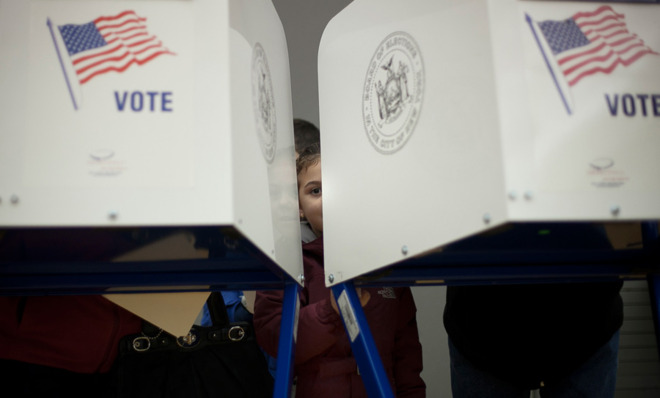This might be our best shot at fixing money in politics
The promise of "Patriot Dollars"

A free daily email with the biggest news stories of the day – and the best features from TheWeek.com
You are now subscribed
Your newsletter sign-up was successful

It's the newest idea on political money: Make everyone a donor. It might be our best shot to navigate the shoals of modern campaign finance law, and bring positive change.
Why does this matter now? If the Supreme Court rules as expected in the case McCutcheon vs. FEC, overturning the limit on the total amount of money any one person can donate to all federal campaigns, they will pull out the last cornerstone of the system of regulating money in politics established after Watergate. But even if the Court upholds that limit, there isn't much left of the old system of limits and disclosure. The money that matters now moves outside of the regulated system.
The bigger problem is that there aren't many fresh ideas about how to reduce the distortion of democracy by economic inequality, especially ideas that would also survive the Court's scrutiny. In Washington, the main solutions have been improved disclosure and better enforcement of rules about coordination between campaigns and outside spending groups — both weak attempts to salvage remnants of the old system. Outside Washington, there's enthusiasm about a constitutional amendment that would overturn Citizens United, or declare that corporations aren't people, or some other purely symbolic gesture of futility.
The Week
Escape your echo chamber. Get the facts behind the news, plus analysis from multiple perspectives.

Sign up for The Week's Free Newsletters
From our morning news briefing to a weekly Good News Newsletter, get the best of The Week delivered directly to your inbox.
From our morning news briefing to a weekly Good News Newsletter, get the best of The Week delivered directly to your inbox.
The most promising solutions are in the experiments with public financing, either giving candidates who show broad support a fixed amount to run their campaigns (an innovation that we examined at New America in January), or by matching small contributions, as in New York City's hugely successful system. (In testimony to the New York City Campaign Finance Board earlier this month, I argued that "differences in candidates access to private funds matter less in New York City than in just about any political jurisdiction in the U.S.")
But there is one fairly new idea that has real promise, and it is reflected in a new piece of legislation introduced on Feb. 4 by Rep. John Sarbanes of Maryland, along with House Minority Leader Nancy Pelosi, which now has 133 cosponsors, including one Republican. It's the idea that every single American can be a political donor, through a voucher that can be used to support any candidate or several, or a party.
The Sarbanes bill, known as the Government By the People Act, would couple a version of the New York City model (which matches small donations at 6:1), with a $25 tax credit for political contributions, so that in effect, every American would have a "free" $25 to contribute to political campaigns.
The idea of vouchers — giving every American adult a coupon that they could use to become a campaign donor — has floated around the edges of the academic conversation about money in politics for several years. Their best-known advocate has been Yale law professor Bruce Ackerman, who in his 2004 book, Voting with Dollars, co-authored with political scientist Ian Ayres, called them "Patriot Dollars." Up the road at Harvard Law School, Lawrence Lessig made vouchers one of several reform solutions he called for in his recent "New Hampshire Rebellion." Vouchers are a major feature of the "American Anti-Corruption Act," a comprehensive model bill developed by the organization, Represent.us. At least some conservatives and Republicans are open to vouchers, a model based on individual control and choice that they have supported in many other circumstances.
A free daily email with the biggest news stories of the day – and the best features from TheWeek.com
While Ackerman's Patriot Dollars would be tangible coupons, the same effect can be achieved through a tax credit, as long as its benefits are available to everyone, including people who don't earn enough to pay taxes. A few states offer tax credits for small campaign contributions, but many are underutilized. Minnesota's system is probably the ideal model: contributions of up to $50 are eligible for a credit, and donors can get the refund immediately, rather than waiting until they file their taxes. Research by the Campaign Finance Institute found that more than 45 percent of campaign money in Minnesota's legislative races came in contributions of less than $100, compared with 3 percent in New York. The Sarbanes bill would begin with a tax credit, but also create a pilot of a more direct voucher.
While small-donor matching systems have great promise in reducing the influence of big donors, making it easier for candidates without access to wealth to run, and encouraging participation, they have two shortcomings, one real and one just theoretical. Both would be fixed by vouchers. The real issue is that even a $50 or $100 political contribution is a big lift for a great many Americans, and for the poor and near-poor, it's inconceivable to spend money just to express their political views rather than for some immediate, tangible benefit. (Of course, poor people might be much better off with better elected officials and more supportive public policies, but that's a distant benefit.) A voucher makes everyone a potential donor, and gives all of us the opportunity to express our political views.
The more theoretical shortcoming of small-donor matching systems stems from the possibility that small donors are more ideologically passionate than the average voter, and thus their contributions might favor candidates who would increase the ideological polarization and dysfunction of Congress and legislatures. This is a key question for further research, but if it is a real concern, it could certainly be offset by vouchers, which would encourage more moderate voters whose views are less strongly held to participate, and encourage candidates to reach out to those average voters.
Vouchers or tax credits might have some shortcomings of their own. They might give an advantage to well-known or well-organized candidates, and it might be hard for new candidates to get to a competitive position on $25 or $50 contributions alone. But in concert with other reforms, they hold great promise as a means to reduce the influence of economic inequality and fight corruption, not with limits but by expanding participation and opportunity.
More from The Weekly Wonk...
Sign up to get The Weekly Wonk, New America's digital magazine, delivered to your inbox each Thursday here.
-
 Quiz of The Week: 14 – 20 February
Quiz of The Week: 14 – 20 FebruaryQuiz Have you been paying attention to The Week’s news?
-
 The Week Unwrapped: Do the Freemasons have too much sway in the police force?
The Week Unwrapped: Do the Freemasons have too much sway in the police force?Podcast Plus, what does the growing popularity of prediction markets mean for the future? And why are UK film and TV workers struggling?
-
 Properties of the week: pretty thatched cottages
Properties of the week: pretty thatched cottagesThe Week Recommends Featuring homes in West Sussex, Dorset and Suffolk
-
 The billionaires’ wealth tax: a catastrophe for California?
The billionaires’ wealth tax: a catastrophe for California?Talking Point Peter Thiel and Larry Page preparing to change state residency
-
 Bari Weiss’ ‘60 Minutes’ scandal is about more than one report
Bari Weiss’ ‘60 Minutes’ scandal is about more than one reportIN THE SPOTLIGHT By blocking an approved segment on a controversial prison holding US deportees in El Salvador, the editor-in-chief of CBS News has become the main story
-
 Has Zohran Mamdani shown the Democrats how to win again?
Has Zohran Mamdani shown the Democrats how to win again?Today’s Big Question New York City mayoral election touted as victory for left-wing populists but moderate centrist wins elsewhere present more complex path for Democratic Party
-
 Millions turn out for anti-Trump ‘No Kings’ rallies
Millions turn out for anti-Trump ‘No Kings’ ralliesSpeed Read An estimated 7 million people participated, 2 million more than at the first ‘No Kings’ protest in June
-
 Ghislaine Maxwell: angling for a Trump pardon
Ghislaine Maxwell: angling for a Trump pardonTalking Point Convicted sex trafficker's testimony could shed new light on president's links to Jeffrey Epstein
-
 The last words and final moments of 40 presidents
The last words and final moments of 40 presidentsThe Explainer Some are eloquent quotes worthy of the holders of the highest office in the nation, and others... aren't
-
 The JFK files: the truth at last?
The JFK files: the truth at last?In The Spotlight More than 64,000 previously classified documents relating the 1963 assassination of John F. Kennedy have been released by the Trump administration
-
 'Seriously, not literally': how should the world take Donald Trump?
'Seriously, not literally': how should the world take Donald Trump?Today's big question White House rhetoric and reality look likely to become increasingly blurred